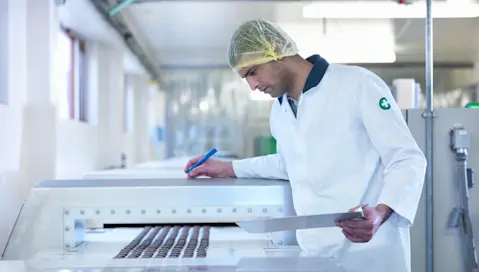Preventing Operational Bottlenecks at Your Food and Beverage Business with ERP Solutions
Preventing Operational Bottlenecks at Your Food and Beverage Business with ERP Solutions
Preventing Operational Bottlenecks at Your Food and Beverage Business with ERP Solutions
8 Févr 2022
John McCurdy
Food manufacturers and processors have by and large come to accept that production bottlenecks are a frustrating inevitability of the industry. With new materials coming in, lines running and orders being dispatched all day long, you’re bound to hit some snags along the way that hamper your operational effectiveness.
That being said, your company isn’t helpless in the face of these issues. A purpose-built software solution, coupled with a sound strategy, can work wonders in alleviating the hindrances that would otherwise put a damper on uptime and output.
In this post, we’ll cover the ways that an enterprise resource planning (ERP) system can help your organization head off bottlenecks before they ever occur. First, though, let’s cover the potential negative effects of the most common impediments and why manual processes for solving them aren’t sufficient in today’s business environment.
The Consequences of Bottlenecks and Manual Methods of Resolution
The most obvious and painful ramification of bottlenecks is decreased efficiency. When time windows are missed and critical processes must be either delayed or stopped while in progress, you eat into your uptime, which means production numbers may fall short of expectations.
That, in turn, can cripple your ability to fulfill orders, which leads to lower customer satisfaction and less revenue from sales. Meanwhile, if staff can’t devote the necessary time for inventory management, proper storage and first-expiry, first-out (FEFO) picking, you may see increased waste and spoilage that also represents financial loss.
Clearly, some bottlenecks may require manual intervention—a jammed belt that’s brought your line to a halt will almost certainly require the attention of a technician—but by and large, jumping from concern to concern as a means of “damage control” is not the best use of your employees’ time. Additionally, that approach is entirely reactive, so it does little to improve future outcomes or solve the root causes of your issues.
4 Features of ERP Software That Prevent Bottlenecks Before They Occur
As unified, cross-functional platforms built with businesses like yours in mind, food industry-specific ERP solutions come packed with tools designed to minimize the chances that bottlenecks occur at your facilities. These are four of the most relevant and useful features of ERP when it comes to these concerns:
1. Inventory Management
The inventory management functions of ERP software help to keep tabs on your stock levels and prevent the possibility of a materials shortage that would otherwise interrupt production. By capturing all critical data elements associated with your ingredients—including varieties, quantities and storage specifications—and updating your numbers in real time, you’ll never be left guessing as to what you’ve got on-hand.
Better still, the system also collects expiration dates and freshness ranges to support your FEFO picking protocols, making your employees aware of what needs to be used next to make the most out of what you’ve already purchased. And when you start to run low on supplies, ERP can automatically place replenishment orders for you, ensuring you never have a stock-out at a critical juncture.
2. Warehouse Layout
We mentioned before that warehouses are busy places. Your workers and motorized vehicles are moving about the floor and must navigate the many shelves, bins and racks that hold your items. As such, congestion and safety hazards are both potential problems that need to be avoided.
The warehouse management modules of ERP platforms allow you to analyze employee performance in warehouse activities to determine whether your floor layout can be better optimized for efficiency and the well-being of your staff. Our industry-specific food and beverage solution, Aptean Food & Beverage ERP, can even integrate with a dedicated warehouse management system (WMS), including Aptean WMS.
3. Preventative Maintenance
Broken or malfunctioning machinery is no doubt one of the most aggravating causes of bottlenecks, as the failure can occur suddenly, with little warning, and have a devastating effect. Here again a proactive stance will serve you best, as conducting preventative maintenance can help prevent such incidents from occurring in the first place.
ERP for food manufacturers and processors facilitate a good preventative maintenance plan by automatically scheduling these crucial procedures during periods of downtime, making sure your equipment continues to function as desired without necessitating a work stoppage. The informative dashboards of ERP interfaces also keep your employees well apprised of what’s on the horizon so that they can plan effectively.
4. Automatic Scheduling
Preventative maintenance isn’t all that ERP solutions can schedule automatically for you. Vital sanitation exercises, quality checks and internal safety audits can also be timed optimally by the system to prevent these events from reducing your production uptime.
While none of these measures will directly affect your operational efficiency, the fact that they are taking place “off the clock”—during off hours or between shifts—helps you get more done in the time that your workers and equipment are active. Plus, you can rest easy knowing that your organization is taking all steps necessary to ensure that products are entirely safe for consumption, taste great and are made according to regulatory standards.
Solutions Designed to Drive Results
Here we covered just a few of the ways that ERP technology help smooth and streamline your operations by preventing bottlenecks and maximizing production uptime. The fact of the matter is that the software can do much, much more, and that’s why an ERP platform makes the ideal foundation for any food and beverage company’s digital transformation.
From recipe and formula controls that allow you to fine-tune your offerings, to complete bidirectional traceability tools that keep crucial information highly visible, industry-specific ERP can dramatically improve multiple aspects of your operations with one powerful solution. It’s critically important, though, that any system you consider implementing is built to combat the specific challenges you face as a manufacturer.
At Aptean, we’ve worked with thousands of businesses like yours to successfully deploy our award-winning product. We have in-depth knowledge of the best practices that help food and beverage organizations succeed, and that understanding went into the design of the modules and functions of Aptean Food & Beverage ERP.
We also know that modern operations must remain flexible in this era of increasing disruption, and that’s one of the reasons we recommend cloud setups to maximize accessibility and our clients’ ability to adapt to changing circumstances. While on-premise installations are also available and perfectly viable, we offer 99.9% reliability with cloud, as redundant servers and dedicated IT teams provide an extra level of assurance.
Finally, we pride ourselves on acting as a partner to all of our customers, guiding them through the process of putting the technology in place and providing suggestions to improve existing processes. And once it’s all rolled out, users appreciate the familiar Microsoft Dynamics 365-based interface and automatically applied updates.
Ready to learn more about how Aptean solutions can improve outcomes for your company? Contact us today or request a specialized demo.
Prêt à transformer votre entreprise ?
Nous avons les solutions ERP spécialisées dont vous avez besoin pour relever les défis de votre secteur.



